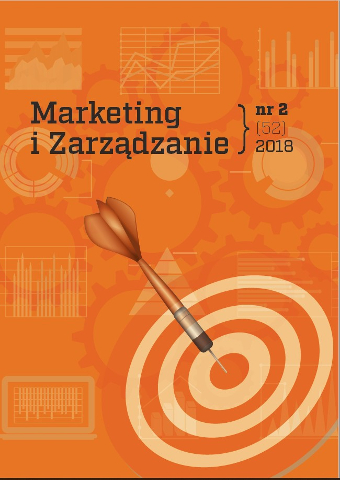
ISSN: 2450-775X
OAI
DOI: 10.18276/miz.2018.52-04


Issue archive /
nr 2 (52) 2018
Organizacja wielkich wydarzeń sportowych w realizacji celów marketingu terytorialnego na przykładzie The World Games 2017
(Organization of Big Sport Events in the Implementation of Territorial Marketing Objectives on the Example of the World Games 2017)
| Authors: |
Magdalena
Daszkiewicz
Uniwersytet Ekonomiczny, Wydział Nauk Ekonomicznych |
| Keywords: | territorial marketing city marketing sports marketing big sports events |
| Data publikacji całości: | 2018 |
| Page range: | 10 (39-48) |
| Klasyfikacja JEL: | M38 M39 M30 Z33 |
Abstract
The paper aims to determine possibilities resulting from linking the implementation of sport and territorial marketing objectives within the organization of a big sport event. The paper attempts to identify opportunities related to long-term planning and implementation of programs binding sports and development goals of the organizer's city. The basis for the performance of the purpose are theoretical considerations and analysis of the example of The World Games 2017, based on desk research.
Download file
Article file
Bibliography
| 1. | Berg, L. van den (2002). Sports and city marketing in European cities. London & New York: Routledge Taylor & Francis Gorup. |
| 2. | Bob, U., Swart, K. (2010). Sport events and social legacies. Alternation, 17 (2), 72‒95. |
| 3. | Coates, D., Humphreys, B.R. (1999). The growth effects of sports franchises, stadia, and arenas. Journal of Policy Analysis and Management, 18, 601–624. |
| 4. | Conejo, R., Baños-Pino, J., Canal Domínguez, J., Rodríguez, P. (2007). The economic impact of football on the regional economy. International Journal of Sport Management and Marketing, 2 (5/6), 459‒474. |
| 5. | Daszkiewicz, N. (2011). Wpływ EURO 2012 na rozwój regionu – aspekty teoretyczne i wyniki badań empirycznych. Zeszyty Naukowe Uniwersytetu Szczecińskiego, 690. Ekonomiczne Problemy Usług, 79, 70‒81. |
| 6. | Edensor, T, Millington, S. (2008). 'This is Our City': Branding football and local embeddedness. Global Networks, 8, 172‒193. |
| 7. | International Worldgames Assocation (2017). Evaluation Report. The Word Games 2017, Wroclaw Poland Post Games. Pobrano z: www.floorball.org/Liitetiedostot/CB/CB%202017%20December/Appex%2018%20-%20%20TWG%202017%20Wroclaw%20Evaluation%20Report%20(002).pdf. |
| 8. | Janas, P. (2017). Wiemy, ile kosztowała organizacja The World Games. Gazeta Wrocławska, 31.07. |
| 9. | Johnson, B.K., Groothuis, P.A., Whitehead, J.C. (2001). The value of public goods generated by a major league team: The CVM Approach. Journal of Sports Economics, 2, 6–21. |
| 10. | Kotler, Ph, Lee, N.R. (2011). Social Marketing: Influencing Behaviors for Good. Thousand Oaks: Sage Publications. |
| 11. | Kozma, G. (2010). Sport as an element in the place branding activities of the local governments. GeoJournal of Tourism and Geosites, 2 (6), 133‒143. |
| 12. | Kropielnicki, K. (2018). GSI Event Study, The World Games 2017. Wrocław, Poland 20 July–30 July 2017 Sportcal Global Communications Ltd. |
| 13. | Legacy czyli dziedzictwo. Aktywizacja sportowa (11.10.2017). Pobrano z: https://theworldgames |
| 14. | 2017.com/legacy-czyli-dziedzictwo/. |
| 15. | Mason, D.S.(2012). Sports facilities and urban development: An introduction. City, Culture and Society, 3, 165–167. |
| 16. | Müller, M. (2015).What makes an event a mega-event? Definitions and sizes. Leisure Studies, 34 (6), 627‒642. |
| 17. | Mullin, B.J., Hardy, S., Sutton, W.A. (1993). Sport marketing (1st Edition). Champaign, IL: Human Kinetics. |
| 18. | Oldenboom E. R. (2006). Costs and Benefits of Major Sports Events A Case Study of Euro 2000. Amsterdam: MeerWaarde Onderzoeksadvies. |
| 19. | Ritchie, J. R. B. (1984). Assessing the impact of hallmark events: Conceptual and research issues. Journal of Travel Research, 23, 2–11. |
| 20. | Roberts, A., Roche, N., Jones, C., Munday, M. (2016). What is the value of a Premier League football club to a regional economy? European Sport Management Quarterly, 16, 1‒17. |
| 21. | Rzeszowski, J. (2017). Finansowanie klubów sportowych z budżetu jednostek samorządu terytorialnego – sposoby wsparcia i studium interpretacji przepisów. Prawo Budżetowe Państwa |
| 22. | i Samorządu, 2 (5), 45‒59. |
| 23. | Santo, C.A. (2007). Beyond the economic catalyst debate: Can consumption benefits justify a municipal stadium investment? Journal of Urban Affairs, 29, 455–479. |
| 24. | Sznajder, A. (2015). Marketing sportu. Warszawa: PWE. |
| 25. | Szromnik, A. (2016), Marketing terytorialny – miasto i region na rynku. Warszawa: Wolters Kluwer. |
| 26. | The World Games (2017). Final Report. Wrocław Organizing Committee 2017. Wroclaw. Pobrano z: https://www.theworldgames.org/files/wg2017/2017-12-29%20WOC%20FINAL%20 |
| 27. | REPORT.pdf. |
| 28. | Verriet, J. (2018). Football clubs, city images and cultural differentiation: Identifying with rivalling Vitesse Arnhem and NEC Nijmegen. Urban History, May, 1‒22. |
| 29. | Wasilczuk, J.E. (2010). Wpływ dużych wydarzeń sportowych na gospodarkę – aspekty teoretyczne. W: N. Daszkiewicz, J. Wasilczuk (red.), Euro 2012. Czy mała firma na Pomorzu może zyskać? Gdańsk: WZiE Politechnika Gdańska. |
| 30. | Zawadzki, K.M (2013). Publiczne a prywatne finansowanie wielkoformatowych imprez sportowych na przykładzie Mistrzostw Europy w Piłce Nożnej. Zarządzanie i Finanse, 11, 511‒522. |
| 31. | Żuryński, R. (2013). Społeczno-ekonomiczne aspekty organizacji imprez sportowych. Nauki Społeczne, 2 (8), 254‒269. |